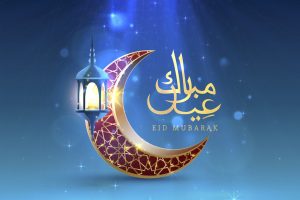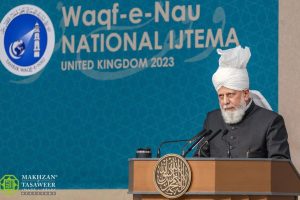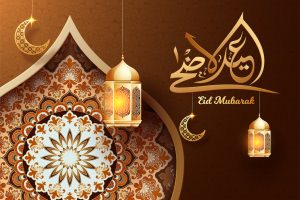
Ayyaz Mahmood Khan, UK
Muslims throughout the world come together to celebrate twice during the year. The first is Eid-ul-Fitr, which is celebrated after the month of Ramadan as an expression of gratitude to God Almighty for having been given the ability to worship and remember Him with increased intensity and care during this month—as special efforts are made in Ramadan in this respect. The month of Ramadan is a month which comes to inculcate within us a spirit of service to humanity and compassion for our fellow human beings. Muslims worship God with a deeper sense of reflection and strive to improve themselves spiritually and morally. They fast during the day so that they may become more cognizant of the needs of their less fortunate brothers and sisters. On Eid-ul-Fitr, Muslims thank Allah for not only growing closer to Him, but also closer to humanity, by experiencing the pain of those less fortunate than them.
The second celebration observed once a year by Muslims throughout the world marks the end of the annual pilgrimage to Mecca known as the Hajj. This Eid is called Eid-ul-Adha, ‘the Festival of Sacrifice’ and is also called the ‘Greater Eid.’ This Eid commemorates the willingness of Prophet Abraham (as) to sacrifice his own son in the way of God.
The Holy Qur’an recounts that Prophet Abraham had seen in a dream that he was slaughtering his only son, Ishmael (as). When his son grew old enough to walk with him and understand, Prophet Abraham (as) shared the dreams that he had been experiencing, with his son, and asked him how he felt about this divine indication. The young Ishmael (as), showing courage and full trust in God responded immediately: ‘O my father, do as you have been commanded, you will find me, if Allah pleases, as one of those who are patient.’[1] Upon this, when father and son were about to fulfil this divine command, in the manner that they understood, and Abraham (as) was about to physically slaughter his dear son Ishmael (as), a voice was heard and God informed Abraham (as) that he had misunderstood the deeper meaning of his dream. Abraham (as) was instructed to slaughter a ram instead, as a symbolic expression of the deeper sacrifice which God wanted from father and son.
The fact of the matter is that Abraham’s (as) dream was not an indication from God to physically slaughter Ishmael (as). Physical, human slaughter has never been a sacrifice that God has demanded in any age through his Prophets. The slaughtering which God sought was that of metaphoric nature; a slaughtering of the inner self. In reality, God’s desire was for Abraham (as) to instil within his son, such qualities as would make him a true servant of God, wholly devoted to Him. This slaughtering of the ego, selfish passions, desire, and satanic influence was a far greater sacrifice than anything else. This is the sacrifice that all seekers must make on their quest towards God. These evils which cast a darkness over our hearts is a weight that holds us down, and until our evil inclinations and love for the world do not subside completely, we cannot move towards God, nor can we find the light that leads us to the threshold of our Lord.
It was Abraham’s (as) willingness to sacrifice for the sake of God, everything that he held dear in this world and the deeper philosophy of inner sacrifice, and ultimate devotion to the cause of God which is celebrated in the annual pilgrimage or Hajj and in the celebrations of Eid-ul-Adha; and it is these very deeper values that are metaphorically expressed by the slaughter of animals during Eid-ul-Adha.
In this Festival of Sacrifices, Muslims are reminded that in order for them to be true Muslims, like Abraham (as), they must be willing to offer, with selfless devotion, everything they love and cherish to attain the pleasure of God and to serve humanity at large, with a deep sense of compassion and true love.
The concept of sacrifice holds fundamental importance in every religion, and sacrifice for the sake of God and for the sake of humanity is of paramount importance. The Holy Qur’an presents an illustration of the life of Prophet Muhammad (sa) in the following words:
Say, ‘My Prayer and my sacrifice and my life and my death are all for Allah, the Lord of the worlds.’[2]
Only when our entire life revolves around service to God and service to humanity can we truly attain the pleasure of God, and both Eid-ul-Fitr and Eid-ul-Adha come to remind us of this very important truth.
In the month of Ramadan Muslims give up their food and drink, and fast for thirty days as an act of sacrifice so that they are able to feel the pain of those who are less fortunate than them; so that they are prompted to reflect within their own souls and not only strengthen their relationship with God but also to forge stronger bonds with their fellow human beings. Eid-ul-Fitr marks the end of Ramadan and a new beginning. It is celebrated to remind us that just as we felt the pangs of thirst and hunger in Ramadan for Allah’s sake, we must continue to sacrifice our worldly comforts to ease the pain and suffering of the world around us. Eid-ul-Adha comes shortly thereafter to reinforce this sense of sacrifice and reminds us of the sacrifice of Abraham (as) and Ishmael (as). It comes to remind us that giving up our worldly comforts is indeed important, but in order for us to be truly devoted servants of God and true Muslims, we must be prepared to offer an even greater sacrifice – the ultimate sacrifice – which is the willingness to exert all our strength and give every ounce of our being, until our very last breath, to seek the pleasure of God and serve humanity – just as Abraham (as) and Ishmael (as) were willing to sacrifice every fibre of their own beings and all that they cherished as an expression of pure and selfless devotion to seek the pleasure of God. This is the greater sacrifice that is taught to us in Eid-ul-Adha, and this is why Eid-ul-Adha or the Festival of Sacrifices, is the Greater Eid.
About the Author: Ayyaz Mahmood Khan is an Imam who spent seven years in the International Theological College of the Ahmadiyya Muslim Community in London where he studied the oriental languages of Persian, Arabic and Urdu, as well as comparative religions specialising in colonial South Asian polemic literature of the nineteenth century. Ayyaz has produced and presented numerous television programs focusing on the interplay of modern society and religion. He has given lectures at UCL and Imperial College in areas of Shariah and the Islamic concept of the Caliphate.
[1] The Holy Qur’an 37:103
[2] The Holy Qur’an 6:163




Add Comment